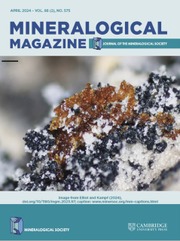Article contents
Agmantinite, Ag2MnSnS4, a new mineral with a wurtzite derivative structure from the Uchucchacua polymetallic deposit, Lima Department, Peru
Published online by Cambridge University Press: 02 July 2018
Abstract
Agmantinite, ideally Ag2MnSnS4, is a new mineral from the Uchucchacua polymetallic deposit, Oyon district, Catajambo, Lima Department, Peru. It occurs as orange–red crystals up to 100 μm across. Agmantinite is translucent with adamantine lustre and possesses a red streak. It is brittle. Neither fracture nor cleavage were observed. Based on the empirical formula the calculated density is 4.574 g/cm3. On the basis of chemically similar compounds the Mohs hardness is estimated at between 2 to 2½. In plane-polarised light agmantinite is white with red internal reflections. It is weakly bireflectant with no observable pleochroism with red internal reflections. Between crossed polars, agmantinite is weakly anisotropic with reddish brown to greenish grey rotation tints. The reflectances (Rmin and Rmax) for the four standard wavelengths are: 19.7 and 22.0 (470 nm); 20.5 and 23.2 (546 nm); 21.7 and 2.49 (589 nm); and 20.6 and 23.6 (650 nm), respectively.
Agmantinite is orthorhombic, space group P21nm, with unit-cell parameters: a = 6.632(2), b = 6.922(2), c = 8.156(2) Å, V = 374.41(17) Å3, a:b:c 0.958:1:1.178 and Z = 2. The crystal structure was refined to R = 0.0575 for 519 reflections with I > 2σ(I). Agmantinite is the first known mineral of  ${M}_{\rm 2}^{\rm I} $MIIMIVS4 type that is derived from wurtzite rather than sphalerite by ordered substitution of Zn, analogous to the substitution pattern for deriving stannite from sphalerite. The six strongest X-ray powder-diffraction lines derived from single-crystal X-ray diffraction data [d in Å (intensity)] are: 3.51 (s), 3.32 (w), 3.11 (vs), 2.42 (w), 2.04 (m) and 1.88 (m). The empirical formula (based on 8 apfu) is (Ag1.94Cu0.03)Σ1.97(Mn0.98Zn0.05)Σ1.03Sn0.97S4.03.The crystal structure-derived formula is Ag2(Mn0.69Zn0.31)Σ1.00SnS4 and the simplified formula is Ag2MnSnS4.
${M}_{\rm 2}^{\rm I} $MIIMIVS4 type that is derived from wurtzite rather than sphalerite by ordered substitution of Zn, analogous to the substitution pattern for deriving stannite from sphalerite. The six strongest X-ray powder-diffraction lines derived from single-crystal X-ray diffraction data [d in Å (intensity)] are: 3.51 (s), 3.32 (w), 3.11 (vs), 2.42 (w), 2.04 (m) and 1.88 (m). The empirical formula (based on 8 apfu) is (Ag1.94Cu0.03)Σ1.97(Mn0.98Zn0.05)Σ1.03Sn0.97S4.03.The crystal structure-derived formula is Ag2(Mn0.69Zn0.31)Σ1.00SnS4 and the simplified formula is Ag2MnSnS4.
The name is for the composition and the new mineral and mineral name have been approved by the International Mineralogical Association Commission on New Minerals, Nomenclature and Classification (IMA2014-083).
Keywords
- Type
- Article
- Information
- Copyright
- Copyright © Mineralogical Society of Great Britain and Ireland 2018
Footnotes
Associate Editor: David Hibbs
References
- 2
- Cited by


